Construction Claim Letter
Subject: Construction Claim for [Project Name]
Dear [Contractor's Name],
I hope this letter finds you well. I am writing to inform you of certain issues and concerns regarding the construction project for [Project Name], which was contracted to your company. I regret to inform you that the project has not been completed according to the agreed-upon terms and specifications outlined in the contract.
Firstly, I would like to bring to your attention the significant delay in the project timeline. As per the agreed-upon contract, the completion date for the project was set for [date]. However, it is now [current date], and the project is far from completion. This delay has caused significant inconvenience and financial losses for me.
Furthermore, the quality of workmanship provided by your company has been substandard. Multiple defects and deficiencies have been identified throughout the construction process. Some of the key issues include:
1. [Describe the specific defect or deficiency]
2. [Describe the specific defect or deficiency]
3. [Describe the specific defect or deficiency]
These defects not only compromise the aesthetic appeal of the project but also pose potential safety hazards. It is essential that these issues are addressed promptly to ensure the project meets the required standards.
In light of the above concerns, I kindly request the following actions to be taken:
1. Provide a detailed explanation for the project delay and a revised completion timeline.
2. Conduct a thorough inspection of the project site and address all identified defects and deficiencies in a timely manner.
3. Compensate for the financial losses incurred due to the project delay and the additional costs associated with rectifying the defects.
4. Provide assurance that all necessary measures will be taken to prevent such issues from recurring in future projects.
I expect a prompt response within [reasonable time frame] to discuss the matter further and find a mutually agreeable solution. Failure to address these concerns adequately may leave me with no choice but to explore legal remedies to protect my rights and interests.
Please consider this letter as an official notice of claim. I have attached supporting documentation, including photographs and inspection reports, to substantiate the mentioned issues. I trust that we can resolve these matters in a professional and amicable manner.
Thank you for your attention to this matter. I look forward to hearing from you soon.
Yours sincerely,
[Your Name]
Formal Construction Claim Letter
Subject: Construction Claim for [Project Name]
Dear [Contractor/Project Manager Name],
I am writing to formally submit a construction claim regarding [specific issue, e.g., delayed completion, defective work] on the [Project Name]. As per our contract dated [Contract Date], the expected completion date was [Date], and deviations have resulted in [specific consequences, e.g., financial loss, inconvenience].
Please review the enclosed documentation, including inspection reports, photographs, and correspondence records. We request appropriate remedial action, compensation, or adjustment as outlined in our contract.
Kindly acknowledge receipt of this claim and provide your response within [time frame, e.g., 14 days].
Sincerely,
[Your Name]
[Position]
[Company/Organization]
[Contact Information]
Informal Construction Claim Email
Subject: Construction Claim Notification
Hi [Contractor Name],
I hope this email finds you well. I am contacting you regarding [issue, e.g., delays in [Project Name]] which has affected our project timeline.
Attached are photos and a brief summary of the situation. Please let me know how we can resolve this matter promptly.
Thanks,
[Your Name]
[Contact Information]
Provisional Construction Claim Letter
Subject: Provisional Construction Claim for [Project Name]
Dear [Contractor Name],
This is a provisional claim regarding potential defects or delays identified in the [Project Name]. Our initial assessment suggests [brief description of issues].
A detailed report and supporting documentation will follow shortly. We request that you acknowledge this provisional claim and provide preliminary feedback.
Sincerely,
[Your Name]
[Position]
[Company/Organization]
[Contact Information]
Serious Incident Construction Claim Letter
Subject: Urgent Construction Claim – Immediate Action Required
Dear [Contractor/Project Manager Name],
This letter serves as a formal notice of a critical issue in [Project Name], specifically [describe the serious issue]. This matter has resulted in [specific consequences, e.g., safety hazards, regulatory concerns, financial losses].
We request urgent remedial action in accordance with our contract. Please provide written confirmation of your proposed corrective measures within [time frame, e.g., 7 days].
Failure to respond may result in further legal or contractual action.
Sincerely,
[Your Name]
[Position]
[Company/Organization]
[Contact Information]
Quick Construction Claim Email
Subject: Construction Claim Submission
Hi [Contractor Name],
We have identified issues in [Project Name], including [brief description]. Please see the attached documentation and advise on corrective steps.
Regards,
[Your Name]
[Contact Info]
Heartfelt Construction Claim Letter
Subject: Construction Claim – Request for Resolution
Dear [Contractor Name],
We greatly value our collaboration on [Project Name], but unfortunately, certain issues have arisen, including [issues]. These have caused [impact, e.g., delays, inconvenience, financial implications].
We hope to resolve this matter amicably and request your cooperation in addressing the issues. Documentation is attached for your review.
Thank you for your prompt attention.
Sincerely,
[Your Name]
[Position]
[Company/Organization]
[Contact Information]
What is a Construction Claim Letter and Why It is Necessary
- A construction claim letter is a formal document used to notify contractors or project managers of issues affecting a construction project.
- Purpose:
- Document deviations from contract terms (delays, defects, cost overruns).
- Request corrective action or compensation.
- Provide evidence for legal or contractual recourse if required.
- Maintain professional communication and protect rights.
Who Should Send a Construction Claim Letter
- Property owners, developers, or clients facing issues in a construction project.
- Project managers or legal representatives on behalf of clients.
- Contractors submitting claims to subcontractors or suppliers.
- Anyone responsible for enforcing contractual obligations or addressing disputes.
Whom Should a Construction Claim Letter Be Addressed To
- The main contractor or subcontractor responsible for the issue.
- Project managers or site supervisors.
- Relevant legal or administrative offices if required.
- Sometimes to insurance companies for claims related to damages or losses.
When to Send a Construction Claim Letter
- When a project deadline is missed or significantly delayed.
- If construction work is defective or not meeting contract specifications.
- Following discovery of cost overruns, material shortages, or safety violations.
- After initial attempts to resolve issues informally have failed.
- During provisional investigations to notify concerned parties of potential claims.
Requirements and Prerequisites Before Writing a Construction Claim Letter
- Review the contract to understand obligations and remedies.
- Collect supporting evidence: photos, inspection reports, correspondence.
- Document timelines and impacts (financial, operational, or safety).
- Identify specific remedies or compensation requested.
- Confirm internal approval to issue the claim (legal or management sign-off).
Formatting Guidelines for Construction Claim Letters
- Length: 1–2 pages; concise yet comprehensive.
- Tone: Professional and factual; serious for major issues, informal for minor claims.
- Structure: Subject, greeting, detailed description of issues, requested actions, closing.
- Mode: Printed letters for formal claims, emails for preliminary or minor claims.
- Etiquette: Respectful, non-accusatory language, clear deadlines for response.
Elements and Structure of a Construction Claim Letter
- Subject line: Clear statement (e.g., "Construction Claim for [Project Name]").
- Opening greeting
- Description of the issue: Include timeline, details, and impacts.
- Reference to contract terms where applicable.
- Supporting evidence: Attach reports, photos, invoices.
- Requested actions: Remedies, corrective measures, or compensation.
- Deadline for response
- Closing remarks and contact information
- Sign-off: Professional closing.
Common Mistakes to Avoid
- Sending a claim without supporting evidence.
- Using emotional or accusatory language.
- Missing contract references or relevant clauses.
- Failing to specify requested remedies or deadlines.
- Delays in sending claims after discovering issues.
- Ignoring proper chain of communication or contractual procedure.
After Sending / Follow-up Actions
- Confirm receipt of the letter.
- Track responses and maintain documentation of communications.
- Negotiate resolutions or corrective actions.
- Prepare for potential escalation, including legal or contractual action if necessary.
- Monitor project progress after corrective measures are implemented.
Tricks and Tips for Effective Construction Claim Letters
- Attach visual evidence to support claims.
- Reference exact contract clauses to strengthen your case.
- Be concise yet detailed—avoid vague descriptions.
- Use professional, neutral tone to maintain credibility.
- Set realistic deadlines for response and remediation.
- Keep a copy of all correspondence for legal protection.
FAQs About Construction Claim Letters
- Q: Do I need legal assistance to send a claim?
A: Not always, but legal review can strengthen complex claims. - Q: Can a claim be submitted via email?
A: Yes, for preliminary or minor claims, but formal letters are preferred for serious issues. - Q: How long should I wait for a response?
A: Typically 7–14 days, depending on the severity of the claim. - Q: What if the contractor disputes the claim?
A: Be prepared to negotiate or escalate following contract terms. - Q: Should I include financial calculations?
A: Yes, if claiming compensation for losses or additional costs.

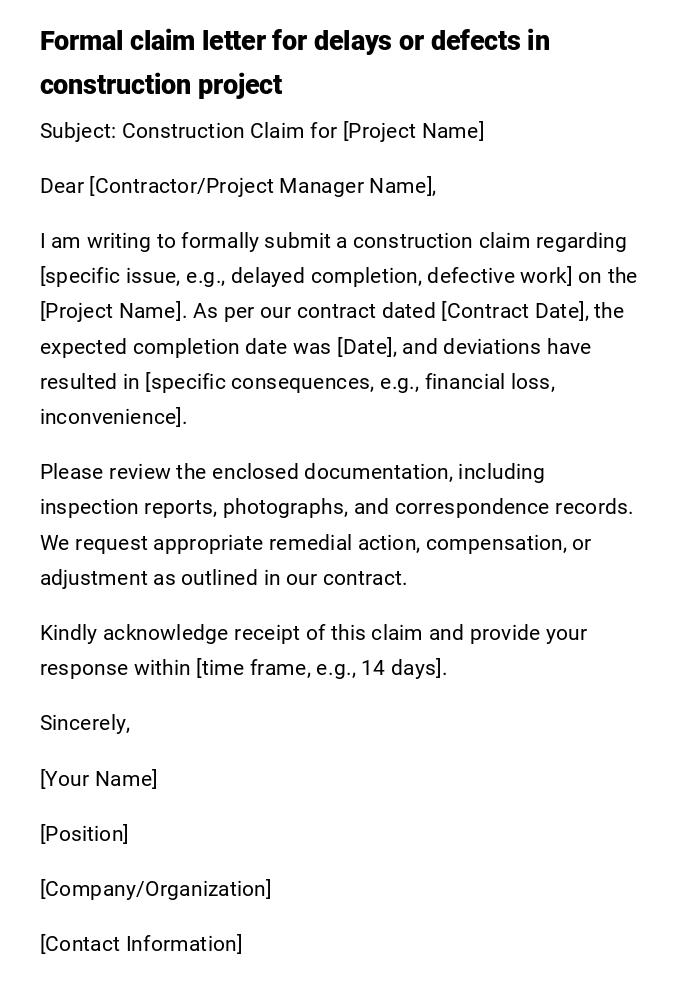
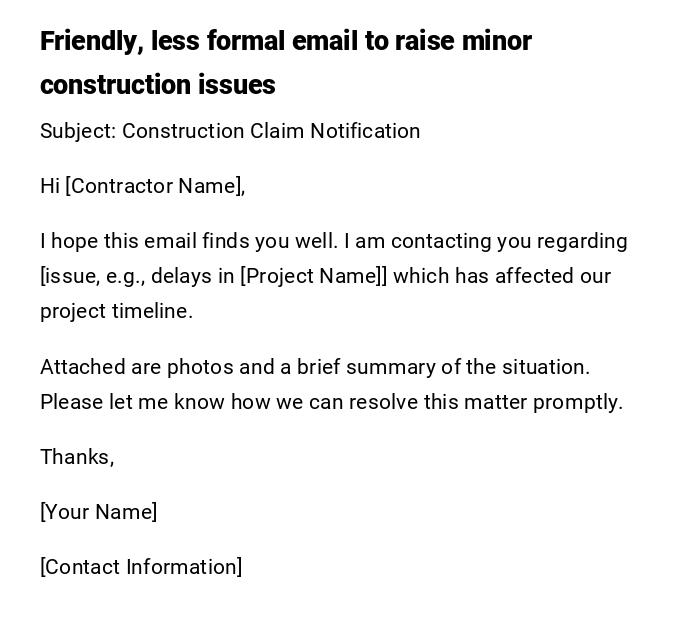
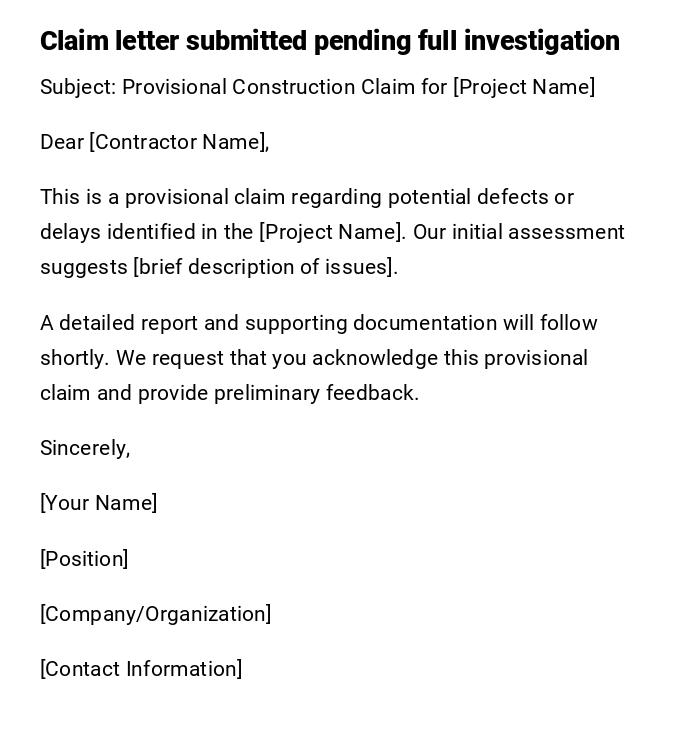
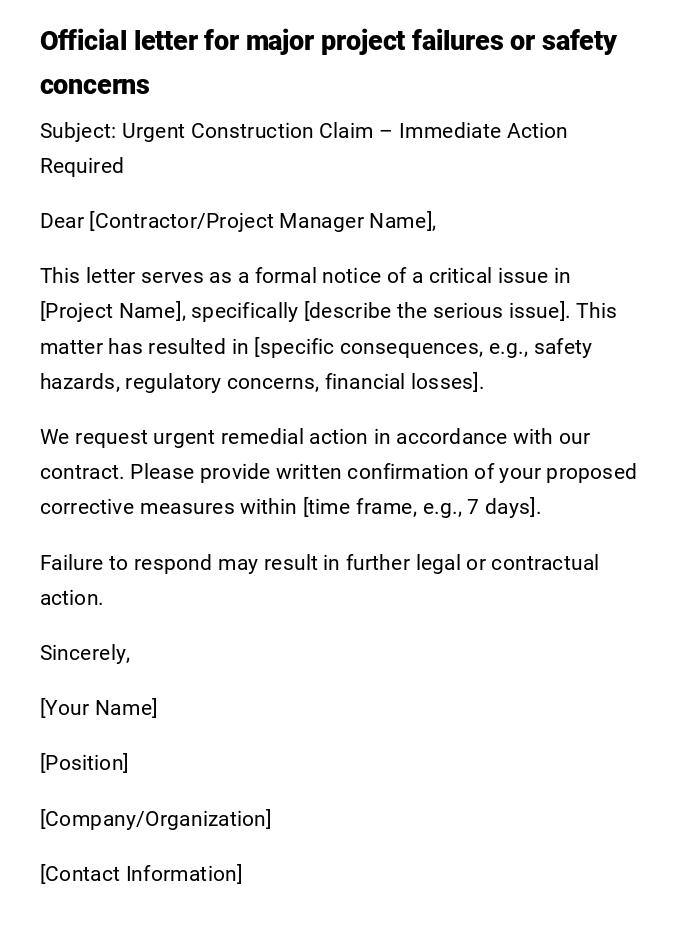
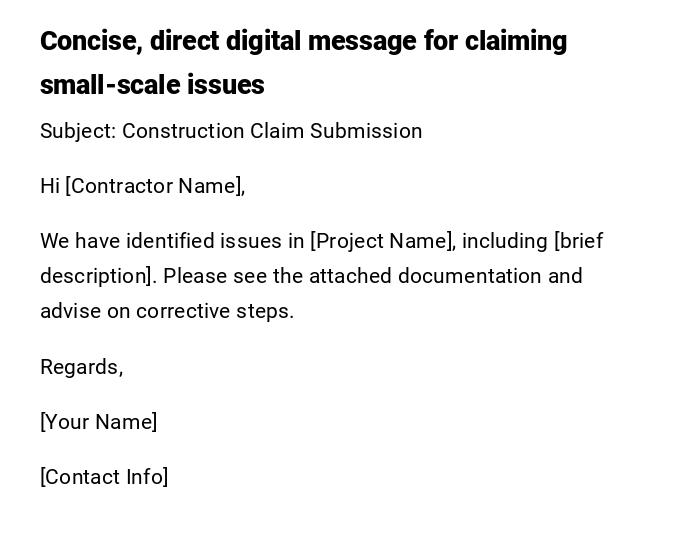
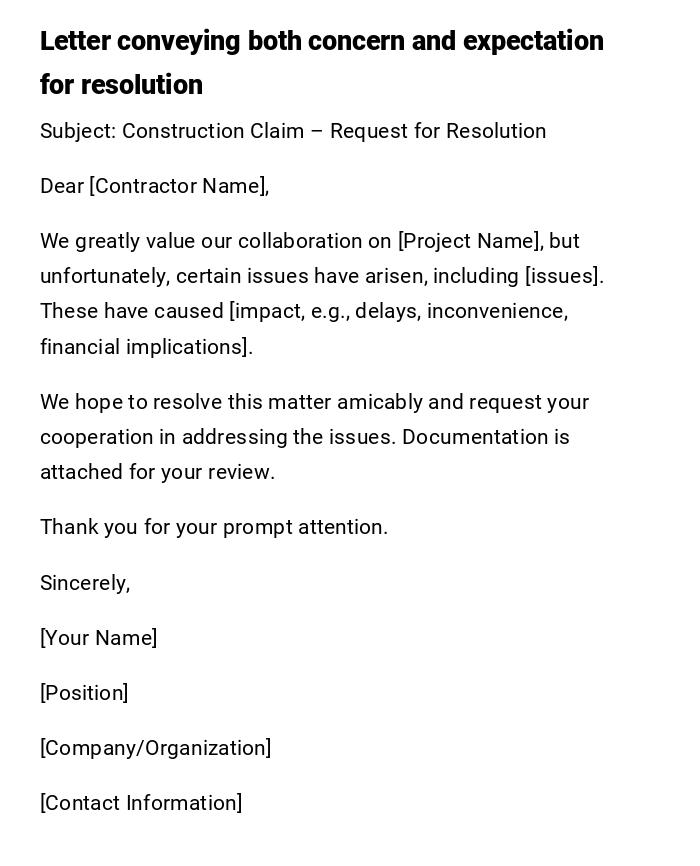

 Download Word Doc
Download Word Doc
 Download PDF
Download PDF